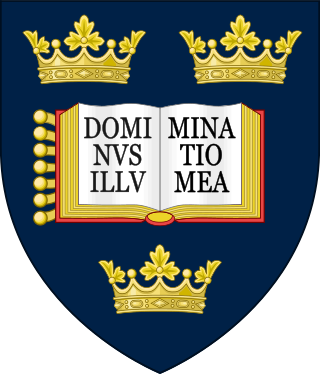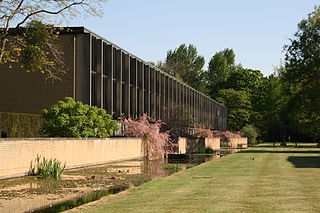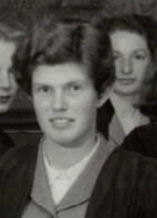Related Research Articles

The University of Oxford is a collegiate research university in Oxford, England. There is evidence of teaching as early as 1096, making it the oldest university in the English-speaking world and the world's second-oldest university in continuous operation. It grew rapidly from 1167, when Henry II banned English students from attending the University of Paris. After disputes between students and Oxford townsfolk in 1209, some academics fled north-east to Cambridge where they established what became the University of Cambridge. The two English ancient universities share many common features and are jointly referred to as Oxbridge.

St Catherine's College is one of the constituent colleges of the University of Oxford. In 1974, it was also one of the first men's colleges to admit women. It has 528 undergraduate students, 385 graduate students and 37 visiting students as of December 2020, making it one of the largest colleges in either Oxford or Cambridge.

Fitzwilliam College is a constituent college of the University of Cambridge.

A scholarship is a form of financial aid awarded to students for further education. Generally, scholarships are awarded based on a set of criteria such as academic merit, diversity and inclusion, athletic skill, and financial need, research experience or specific professional experience.

St Paul's School is a selective independent day school for boys aged 13–18, founded in 1509 by John Colet and located on a 43-acre site by the Thames in London.

Girton College is one of the 31 constituent colleges of the University of Cambridge. The college was established in 1869 by Emily Davies and Barbara Bodichon as the first women's college in Cambridge. In 1948, it was granted full college status by the university, marking the official admittance of women to the university. In 1976, it was the first Cambridge women's college to become coeducational.
The British undergraduate degree classification system is a grading structure for undergraduate degrees or bachelor's degrees and integrated master's degrees in the United Kingdom. The system has been applied in other countries and regions.

An honorary degree is an academic degree for which a university has waived all of the usual requirements. It is also known by the Latin phrases honoris causa or ad honorem . The degree is typically a doctorate or, less commonly, a master's degree, and may be awarded to someone who has no prior connection with the academic institution or no previous postsecondary education. An example of identifying a recipient of this award is as follows: Doctorate in Business Administration (Hon. Causa).
A bursary is a monetary award made by any educational institution or funding authority to individuals or groups. It is usually awarded to enable a student to attend school, university or college when they might not be able to, otherwise. Some awards are aimed at encouraging specific groups or individuals into study.
An athletic scholarship is a form of scholarship to attend a college or university or a private high school awarded to an individual based predominantly on their ability to play in a sport. Athletic scholarships are common in the United States and to a certain extent in Canada, but in the vast majority of countries in the world they are rare or non-existent.

Keith Anderson Hope Murray, Baron Murray of Newhaven, KCB was a British academic and Rector of Lincoln College, Oxford.
The Canada Millennium Scholarship Foundation was a private, independent organization created by an act of the Parliament of Canada in 1998. It received an initial endowment of $2.5 billion from the federal government to provide awards annually for ten years. The foundation distributed $325 million in the form of bursaries and scholarships each year throughout Canada in support of post-secondary education. As well, the foundation conducted research into post-secondary access, via the Millennium Research Program.

Walthamstow Hall is a private day school for girls in the centre of Sevenoaks, Kent, England. It was founded by Dorothea Foulger as a school for the daughters of missionaries in 1838.

The University of Cambridge is a public collegiate research university in Cambridge, England. Founded in 1209, the University of Cambridge is the world's third-oldest university in continuous operation. The university's founding followed the arrival of scholars who left the University of Oxford for Cambridge after a dispute with local townspeople. The two ancient English universities, although sometimes described as rivals, share many common features and are often jointly referred to as Oxbridge. In 1231, 22 years after its founding, the university was recognised with a royal charter, granted by King Henry III.

Annie Mary Anne Henley Rogers was a British promoter of women's education. She had an offer of a university place at the University of Oxford withdrawn when it was realised that the candidate was female. She proved that she was capable of achieving first-class Oxford University degrees but could not receive a formal degree until 1920. Her work as a home tutor for women students led to her being recognised as a founder of St Anne's College, Oxford. She wrote a history of the admission of women to Oxford University and its degrees, which was published posthumously.
The Jack Kent Cooke Foundation is a private, independent foundation which provides scholarship programs to gifted students in the U.S. who have financial need. It offers academic advising and other support services to students from 8th grade to graduate school. Since 2000, it has awarded over $175 million in scholarships to nearly 2,300 students and more than $97 million in grants to organizations that serve gifted low-income students.
Margaret Hubbard was an Australian-born British classical scholar specialising in philology.

The University of Cambridge is a collegiate public research university in Cambridge, England. Founded in 1209 and granted a royal charter by King Henry III in 1231, Cambridge is the second-oldest university in the English-speaking world and the world's fourth-oldest surviving university. The history and influence of the University of Cambridge has made it one of the most prestigious universities in the world. Numerous scholarships, prizes, honors, and awards specific to the university are awarded to prospective or current students.
The Sidney Perry Foundation is a registered charity based in Oxford, UK. The foundation provides assistance in the form of grants to needy students, including overseas students studying in the UK.

Roma Gill OBE, M.A. Cantab., BLitt. Oxon. was a British academic, writer and noted scholar on the works of Shakespeare and Marlowe. She edited more than 30 texts including three in the Oxford School Marlowe series and twenty-one in the Oxford School Shakespeare series, making these works more accessible to younger students. In addition, Gill was a prolific author of scholarly articles and reviews who during her prolific lecturing career inspired her many students with her passion for 16th-century literature. In her later life she developed multiple sclerosis which caused her great pain and disabled her to the extent she couldn't move and had to dictate the notes for her books.
References
- ↑ "Scholarships, Exhibitions and Bursaries". Wellington College, Berkshire . Archived from the original on 21 October 2009.
- ↑ Petrie Watson Exhibitions, Faculty of Arts and Humanities, University of Sheffield. Retrieved 22 January 2020
- ↑ "Annie Rogers". St Anne's College, Oxford . Founding Fellows. Retrieved 12 December 2022.